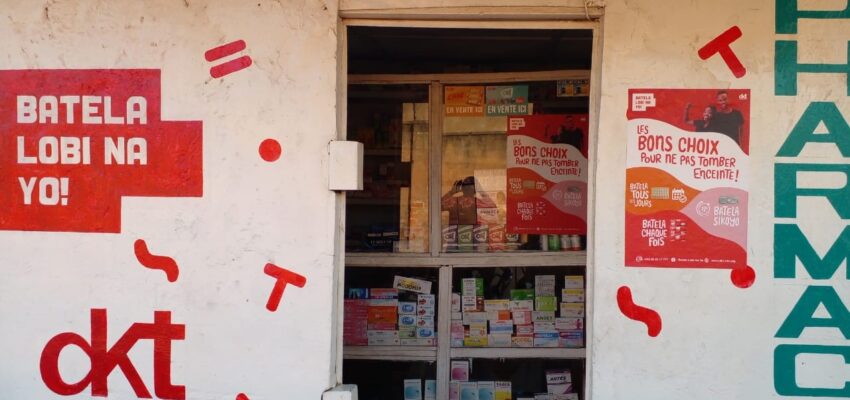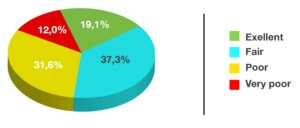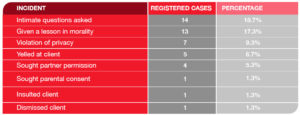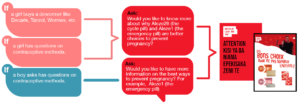
Private pharmacies are an untapped channel with strong growth potential. With funding from the Bill and Melinda Gates Foundation (BMGF), DKT DRC is using this channel to ensure modern, reliable, quality contraceptive products by increasing access to family planning counseling for young people aged 14 to 25.
To view or print as a PDF, click here.
Drugstore Program
Bernard is a pharmacist at Pharmacie La Grande located in Kingabwa, a youth populated neighborhood in Kinshasa with a high percentage of youth. Decorated in DKT’s red and white brand colors and Batela Lobi Na Yo (BLNY) signage, Pharmacy la Grande is one of the main pharmacies in the neighborhood where pharmacists provide and share information on contraception. “Thanks to DKT’s Drugstore program, I can now freely talk about sex without taboo, which is something I couldn’t do before,” Bernard says with a smile. Like many other pharmacists, Bernard is part of DKT DRC’s Batela Lobi Na Yo (“protect your future”) Drugstore program, funded by the Bill and Melinda Gates Foundation (BMGF). The program is designed to train pharmacists in pharmacies that are part of the BLNY network to improve their knowledge of family planning and to help them better assist clients in choosing modern contraceptive methods available in their pharmacies.
Abbreviations:
- BLNY: Batela Lobi Na Yo
- YA: Youth Ambassador
- RH: Reproductive Health
- Bees: Mobile Nurses trained in RH/Family Planning
- OTC: Over-the-counter
- FP: Family Planning
Introduction
In DRC, approximately 600,000 adolescent girls give birth each year and 83% of these pregnancies are unintended. Pharmacies
have become the main source of information and access to contraception, but young people rarely feel welcomed within them. Since the launch of this program, DKT DRC has trained 1,123 BLNY pharmacies equipped to welcome and serve youth.
Since 2018, DKT DRC has used a human-centered approach to train pharmacists and their employees in the provinces of Kinshasa, Kongo Central and Kwango. DKT used retail media strategy to transform pharmacies across DRC into the DKT Batela Lobi Na Yo pharmacy network – safe and inviting places where youth can learn about and access contraception.
The program has specific objectives:
- Training and capacity building of pharmacists
- Raising awareness and create demand
- Improving the visibility of pharmacies
- Promoting sustainability with a direct monitoring model
- Measuring impact in the community
Mystery client study
DKT used 298 BLNY pharmacies as a sampling frame and drew 75 from this list. A group of young ambassadors (YAs), ages 19 to 26, were used as mystery clients and were given a scenario in which they would enter the selected pharmacies to request contraception, without mentioning a specific or preferred method.
Of the 75 pharmacies visited, 67 (89.3%) recommended at least one modern contraceptive method to young clients. Of the 8 pharmacists who refused to provide a method to mystery clients, 4 cited the age of the customer as reason for refusal, adding comments such as future health risks. Overall, 78.7% of pharmacies visited were able to recommend 1 or 2 modern contraceptive methods to mystery clients, but only 10.6% were able to recommend 3 or more.

The evaluation rated providers’ knowledge, quality of the information provided, and quality of the explanations. Provider knowledge scores were rated as “Excellent,” “Fair,” “Poor” and “Very Poor.
Different attitudes and quality of service
“When I told [the pharmacist] that I wanted to use birth control because my boyfriend and I were thinking of having sex, he first told me that unmarried people should not have sex and that these products could be dangerous if I had never had children. Then he asked me what church I attend and told me that the Bible says that sex is only for married people. But he [also] told me he didn’t want me to get in trouble if I got pregnant, so he would make an exception and sell me [the emergency pill] just this once. Then he told me I should go talk to a doctor.”
The paradoxical attitude of pharmacists who discourage contraceptive use for youth on the basis of faulty clinical or moral principles, but who often end up providing a method because they are
concerned about the health and future of the latter remains a critical issue. To address this, pharmacists must build their capacity in providing quality and youth-friendly FP services while improving their technical knowledge of the products that can be offered.

In addition to being asked intimate questions, the most common incident recorded during the visits was being lectured on abstinence and the risks associated to youth sexual conduct and contraceptive use.
Selection process
The Drugstore program empowers pharmacists to become key allies in facilitating youth access to contraception through multi-level training and incentives that reward performance.
As such DKT conducted retailer census activities to identify potential pharmacies and categorized them into three categories based on the following criteria: pharmacy location, merchandising, willingness to serve youth, and product storage capacity.
During this selection process, DKT learned that pharmacists want to feel like they are part of the solution in helping young people prevent unintended pregnancies. Although knowledge of existing products may be low, a little training goes a long way in making new allies for young people; and just as retail media increases sales, a good pharmacist can also change behavior.
Training
DKT launched a team consisting of salesforce, bees, and youth ambassadors to set up BLNY pharmacies and conduct training for pharmacists. After the initial trial period, pharmacists could opt for more in-depth training in their neighborhood.
Throughout 2018, 2019, and 2021, DKT conducted trainings at more than 1,000 pharmacies on topics such as:
- Contraceptive methods available at pharmacies (condoms, emergency contraception, oral contraception)
- Youth-friendly approach
- Merchandising rules and operation of the QR bar code
- Inventory management in pharmacies
With support from the National Reproductive Health Program (PNSR) and the National Adolescent Health Program (PNSA), these sessions are of great importance because they have allowed DKT to bring new capacity and skills to an existing but underutilized distribution channel – thus accounting for an important part of this funding.
This year in Kinshasa, a series of training and refresher courses for pharmacists took place. A total of 236 pharmacists received refresher training and an impressive 201 new pharmacists joined the program. As a result of the program, pharmacists have training and educational tools that will help them provide accurate information and counseling to youth on OTC methods. Over time, pharmacists can access additional discounts and benefit from opportunities based on their interests and performance. The highest performing and most engaged program members will be promoted to BLNY Star pharmacy status.
Promotional products
To date, more than 500 DKT-affiliated pharmacies have been renovated and branded with DTK/BLNY signage.
The renovation and branding materials have proven to make customer experience easier when entering a pharmacy. Exterior branding signals to youth that the pharmacy is part of the BLNY network and therefore a safe place to access contraception and advice.
Shelf displays highlight and differentiate DKT products, particularly Aleze EC & OC. Pop-up displays communicate the product and use cases help to spark conversation between pharmacists and youth about which method to adopt.
In each pharmacy, DKT has implemented different methods of contraception using product displays to help youth understand the different ways to protect themselves, while encouraging them to learn more about the uses and merits of each product.
Youth-friendly approach
The vision of the Drugstore program is to reach as many young people as possible who are seeking advice and modern contraceptive methods.
Through this program, DKT wants to give teens and youth the opportunity to receive information and contraceptive methods without being stigmatized and judged. Youth should be able to access any BLNY pharmacy knowing that they can freely talk about contraception, family planning and other related topics with a pharmacist available to answer any questions they may have and help them choose the best contraceptive methods.
The Drugstore program is designed to provide a consistent, user-friendly experience, from the moment a girl inquires about contraception to the moment she chooses a method.

Social impact
Evidence indicates that when family planning methods are in place and women have resources and access to affordable contraception, they do better in terms of education, work, and health.
DKT therefore focused on presenting over-the-counter products to generate questions and create demand. Consequently, this creates a favorable environment within the pharmacies for young people to interact with the pharmacists.
DKT’s marketing team also played an important role in the success of this program by identifying new pharmacies to join the program after the pilot phase and through the distribution of products. Through this program, pharmacists are equipped with simple tools to proactively provide accurate and relevant information to youth, respond to FAQs and help youth choose the method that is right for them.
DKT RD CONGO is an NGO in reproductive health and a subsidiary of DKT International located in Washigton DC. Rated 4 stars by “Charity Navigator”, DKT is active in more than thirty low- and middle-income countries in Latin America, Asia and Africa, representing nearly 65% of the world’s population. In DRC, DKT is headquartered in the capital city of Kinshasa and has regional offices in the following cities: Kikwit, Matadi, Kisangani, Lubumbashi, Kolwezi, Gemena, Mbuji-Mayi, and Goma. DKT is also active in 20 provinces, including: Central Kongo, Kwango, Kwilu, Maï-Ndombe, Tshopo, Bas and Haut-Uélé, Ituri, North Kivu, Equateur, Mongala, South and North Ubangi, Kasaï Oriental, Lomami, Haut-Katanga, Lualaba, Haut Lomami, and Tanganyika. Thus, DKT DRC participates in Family Planning efforts undertaken by the DRC, materialized by the vision of “responsible parenthood and births” and by the FP2020 initiative aiming to reach a modern contraceptive prevalence rate of 19% by the end of 2020 against 5.4% in 2010.

